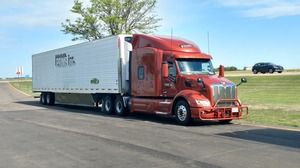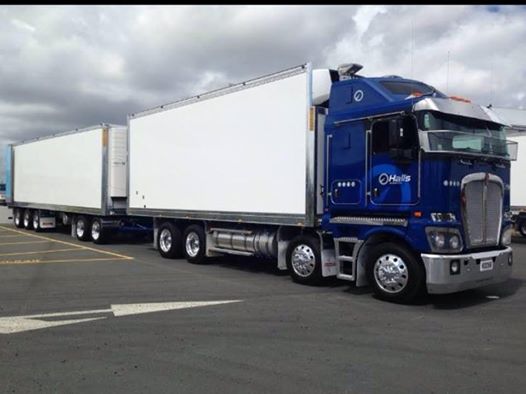Another New Guy!!
Topic 2064 | Page 1

First, welcome to the forum. I, like you, are a Navy vet (retired in 1994) and took the leap into driving 2 years ago.
I presently drive for Prime, have found them to be very accomadating when it comes to riders, etc. Most companies will allow 1 rider due to seat availability, but you might want to ask about that as you are contacting different ones to find answers to your questions. I am sure the rider policy will be more of an insurance issue than a DOT requirement. I am sure others will chime in about that a little later.
I had my own business until just before I took the plunge into driving.
Most of the big companies (not all but most) are lower 48 & Canada. I am sure there are companies out there that stay mostly in the Western US, so just do some research to find the ones that do.
Ask all the questions you want, we all will do our best to answer them for you.
Ernie
DOT:
Department Of Transportation
A department of the federal executive branch responsible for the national highways and for railroad and airline safety. It also manages Amtrak, the national railroad system, and the Coast Guard.
State and Federal DOT Officers are responsible for commercial vehicle enforcement. "The truck police" you could call them.

Number of people that is SUPPOSED to be in a truck is two people. Two seat belts...two people. Some companies allow a trainer to take two people at a time but those are employees.
Yes we are on the same level as McDonald's workers. Unskilled labor at its best. Not sure why we are classed like that but I sure hope it stays that way. The minute our class changes to Skilled Labor companies will start bringing in people from outside the country. Not sure about this part. Its the way a lawyer explained it. Something to do with the way the law is written .
HOS:
Hours Of Service
HOS refers to the logbook hours of service regulations.
Skilled labour comes in under EB3 and EB4 visas, which are as simple as proving that there are no local employees that can do the job there at hand in the employers locality. They also are pretty much up to date on processing those. EB1 an EB2 Visas on the other hand are still having applications made in 2010 processed now, and by definition unskilled means they are meant to be able to locate employees at the local unemployment/welfare office and only where there are no unemployed locals to be employed and trained to the job required can overseas workers be brought in.
If Trucking became a skilled occupation, all the company sponsored schools would close overnight as the seats started getting filled with turban wearers from Bangladesh who raised 10 kids in a shack the size of a 82" sleeper cab while driving old WW2 surplus trucks up and down goat tracks only seeing his wife twice a year to father a new kid every other home time. A sleeper to themselves and getting paid dollars? Their family back home would be the richest in town and he would be rapt at all that space to himself.
It's just the way the immigration system is set up. If you can train someone to do something in less than 6 months, it's in the EB-1 or EB-2 bracket, How long is company trucking school again?
TWIC:
Transportation Worker Identification Credential
Truck drivers who regularly pick up from or deliver to the shipping ports will often be required to carry a TWIC card.
Your TWIC is a tamper-resistant biometric card which acts as both your identification in secure areas, as well as an indicator of you having passed the necessary security clearance. TWIC cards are valid for five years. The issuance of TWIC cards is overseen by the Transportation Security Administration and the Department of Homeland Security.
HOS:
Hours Of Service
HOS refers to the logbook hours of service regulations.Welcome aboard Stephen!
I would like to stay in the West. Any suggestions?
The companies with the most regional freight are dry van and flatbed companies. Swift Transportation and Schneider National are two companies that always come to mind when you mention regional and dedicated freight. They are massive companies with a large variety of opportunities so definitely consider those. But don't stop there!
We have an excellent listing of truck driving jobs. Use your zip code to look up companies that are hiring from your area. That will give you more ideas. I always recommend that people read through our truck driver's career guide when entering the industry. Because you're in school you'll be able to skip certain parts of it but there's a ton of great information about how to evaluate trucking companies and choose one that suits you well.
Regional:
Regional Route
Usually refers to a driver hauling freight within one particular region of the country. You might be in the "Southeast Regional Division" or "Midwest Regional". Regional route drivers often get home on the weekends which is one of the main appeals for this type of route.
Dry Van:
A trailer or truck that that requires no special attention, such as refrigeration, that hauls regular palletted, boxed, or floor-loaded freight. The most common type of trailer in trucking.HOS:
Hours Of Service
HOS refers to the logbook hours of service regulations.OOS:
When a violation by either a driver or company is confirmed, an out-of-service order removes either the driver or the vehicle from the roadway until the violation is corrected.

Thanks to all for the info and links.
Is there a link for what I should take with me for training?
Are laptops good to go?
Clothes? How often can you catch a shower or do laundry?
Advise?
Thanks
Stephen, welcome aboard!
Here's a link with suggestions for what to pack.
You'll probably be able to catch a shower every other day. Your trainer will show you how to use your fuel card to get shower credits. Your showers will always be free because of the amount of fuel you're purchasing. Laptops are good to have with you, although I usually recommend that people leave them at home until they are issued their own truck and running solo. It's just one more thing that takes up space, and if you don't already have a hot spot or something like that for internet access you'll be stuck using the truck stop wifi which is slow and costly.
You'll want to pack lightly, there isn't a lot of room in these trucks and your trainer will already have it filled up with his own gear. Everything I brought with me had to stay right on my bunk with me. Consequently I slept with my feet elevated on my bags at night. Another tip is to bring a sleeping bag instead of bedding sheets and a blanket. The reason is that you may have to sleep while your trainer is driving, and you don't want to sleep in the top bunk in that scenario - it gets very interesting if he were to have to slam on the brakes with you up there! So, what you are going to do is sleep in his bunk. The sleeping bag makes it easy so that you don't get his sheets dirty. You will simply lay your sleeping bag on top of his bedding and go to sleep. Then when you are done you can put it all back up top.
I recommend about one weeks worth of clothing. You should be able to do your laundry about once a week.
The only other advice I would give is be mentally prepared for this to be a difficult time. Not every one experiences a crazy trainer like I did (I call him the Nutty Professor), but there are enough horror stories out there to realize that there are a lot of trainers who probably would be better off doing something else in life. I sincerely hope you get a great trainer and have a great training experience, but if you don't try and look at it with a sense of humor like I did. With you being former military you know what "boot camp" can be like. It's just a hurdle you've got to clear to move on to the next phase in your career. Training for OTR has often been likened to military training, I have no doubts that you can't handle yourself in it like a professional. If you are interested you can read about my experiences with my trainer. Forgive me if you've already come across this link as I've given it out on a few other threads just recently.
Training with the Nutty Professor
Training is where most people start second guessing themselves on whether they made the proper career choice or not, but believe me this is not the time to be re-thinking that. Go into this with a commitment of sticking with this for one full year of safe driving. That first year will confirm for you whether you made the right choice or not, and if you do find out that you're gonna stick with it then you just opened up a world of opportunity for yourself. There will be a whole lot more truck driving opportunities available to you after that first year.
OTR:
Over The Road
OTR driving normally means you'll be hauling freight to various customers throughout your company's hauling region. It often entails being gone from home for two to three weeks at a time.

Thanks Old School You pretty much confirmed what I guess I already knew. But I appreciate the positive reinforcement. Have been getting some apps out there this weekend and I am hoping to talk one on one with some folks this week. Will keep you all posted as things develop.
Many Thanks to all
Bart
New Reply:
New! Check out our help videos for a better understanding of our forum features

















Preview:








 TT On Facebook
TT On Facebook
Hello everyone. My name is Bart, and I have just passed the CDL permit in western Colorado. TT was very instrumental to my passing and I am grateful for the test site here. It helped immensely and I have recommended it to several people.
A little background. 55 yrs old, Navy Vet (Post Viet Nam). Mostly self-employed. Last 15 or so yrs I have been in the "normal work force". Recently unemployed ( with a nudge from my employer ).
From a lad I always thought of driving a big rig and now here I am, making the jump and looking forward to a new career.
Taking a private course, Thank you WIA, and I am very pleased with my choice so far.
I have so many ?s. I would like to stay in the West. Any suggestions? Who has the best mentoring? Dry van at first? Reefers? Tankers? I love the impartiality of TT but everyone has an opinion. PM me at bart61171@q.com with any personal opinions.
I am very much inclined to OTR. Have a family and they are very supportive of this decision and a rider option is very appealing. Can more than 1 ride at a time?
2 Days of classroom instruction, Passed CDL exam (all endorsements ) and Monday I get Introduced to the truck. Very excited!
By the way. Why does the government consider this "unskilled labor"???
Thanks to all
Bart
CDL:
Commercial Driver's License (CDL)
A CDL is required to drive any of the following vehicles:
OTR:
Over The Road
OTR driving normally means you'll be hauling freight to various customers throughout your company's hauling region. It often entails being gone from home for two to three weeks at a time.
Dry Van:
A trailer or truck that that requires no special attention, such as refrigeration, that hauls regular palletted, boxed, or floor-loaded freight. The most common type of trailer in trucking.Reefer:
A refrigerated trailer.